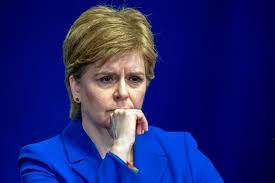Scottish leader Nicola Sturgeon has announced her intention to resign after eight years as the face of her country’s independence movement, amid criticism of her push to make it easier for people to legally change genders.
Sturgeon made the announcement Wednesday during a news conference at her official residence in Edinburgh, saying that part of serving well is knowing when to make way for someone else.
“In my head and in my heart I know that time is now,” she told reporters. “That it’s right for me, for my party, and my country.”
Sturgeon, 52, has led Scotland since 2014 when Scots narrowly voted to remain part of the United Kingdom.
While the independence referendum was touted as a once-in-a-generation choice, Sturgeon and the Scottish National Party have pushed for a second vote, claiming that the rules had altered as a result of Britain’s exit from the European Union. A second referendum was rejected by the British government.
According to Scotland’s first female leader, she struggled with the choice to depart and insisted that it was “not a reaction to short-term constraints.”
Of course, the administration is currently facing challenging difficulties, but when has that ever not been the case?
She has been a steadfast supporter of both independence and legislation that would make it simpler for people in Scotland to legally change their gender, so the statement surprised political watchers.
The measure, which transgender rights advocates have hailed as a turning point, would allow Scots aged 16 or older to modify their identity documents’ gender designations without a doctor’s diagnosis of gender dysphoria.
The British government has delayed the law even though the Scottish parliament approved it because it would generate issues for authorities in other U.K. regions where a medical diagnosis is required before people can transition for legal reasons.
Insisting that the vetoing of the law by Prime Minister Rishi Sunak’s administration was a “deep blunder,” Sturgeon has pledged to sue the British government in court.
Sturgeon has come under fire from some SNP members for stating that she would effectively hold an independence referendum during the upcoming election for the Scottish parliament.
Next month, the party will have a conference to discuss the plan, during which some members will argue that it won’t work and others will accuse Sturgeon of waiting too long to move forward.
Some party members who opposed the gender recognition measure claimed it disregarded the need to safeguard single-sex facilities for women, such as domestic abuse shelters and rape crisis centers.
Although Scotland is still a part of the United Kingdom, it has a semi-autonomous government with extensive authority over several areas, including health care, just like Wales and Northern Ireland do.

















